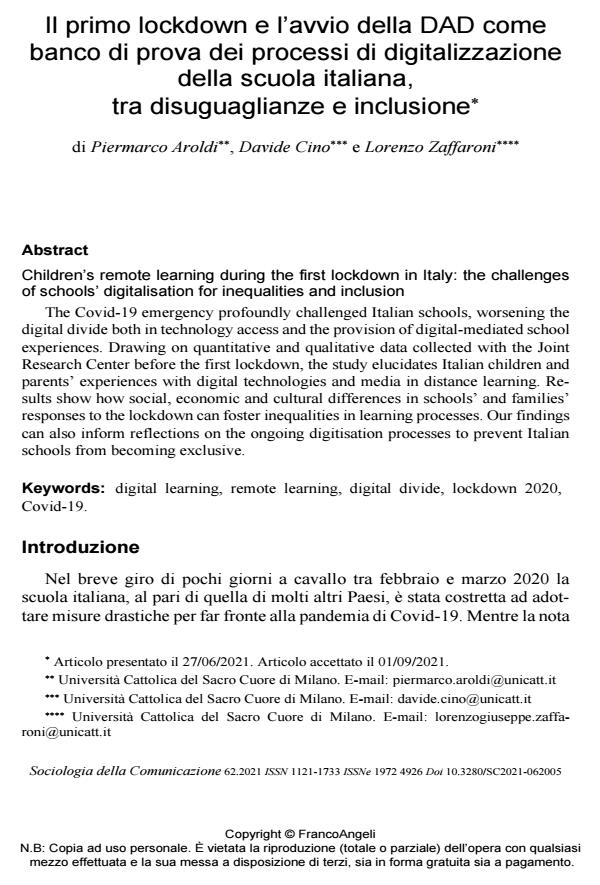Children’s remote learning during the first lockdown in Italy: the challenges of schools’ digitalisation for inequalities and inclusion
Journal title SOCIOLOGIA DELLA COMUNICAZIONE
Author/s Piermarco Aroldi, Davide Cino, Lorenzo Zaffaroni
Publishing Year 2021 Issue 2021/62
Language Italian Pages 18 P. 69-86 File size 295 KB
DOI 10.3280/SC2021-062005
DOI is like a bar code for intellectual property: to have more infomation
click here
Below, you can see the article first page
If you want to buy this article in PDF format, you can do it, following the instructions to buy download credits

FrancoAngeli is member of Publishers International Linking Association, Inc (PILA), a not-for-profit association which run the CrossRef service enabling links to and from online scholarly content.
The Covid-19 emergency profoundly challenged Italian schools, worsening the digital divide both in technology access and the provision of digital-mediated school experiences. Drawing on quantitative and qualitative data collected with the Joint Research Center before the first lockdown, the study elucidates Italian children and parents’ experiences with digital technologies and media in distance learning. Results show how social, economic and cultural differences in schools’ and families’ responses to the lockdown can foster inequalities in learning process-es. Our findings can also inform reflections on the ongoing digitisation processes to prevent Italian schools from becoming exclusive.
Keywords: digital learning, remote learning, digital divide, lockdown 2020, Covid-19
- Bandura A., Schunk D.H. (1981), Cultivating competence, self-efficacy, and intrinsic interest through proximal self-motivation, in «Journal of personality and social psychology», 41(3), pp. 586-598. DOI: 10.1037/0022-3514.41.3.58
- Bourdieu P., Passeron J.C. (1970), La reproduction. Eléments pour une théorie du système d’enseignemen, Les Editions de Minuit, Paris.
- CENSIS (2020), Italia sotto sforzo. Diario della transizione 2020. La scuola e i suoi esclusi, -- https://www.censis.it/sites/default/files/downloads/Diario%20della%20Transizione.pdf (18.08.2021).
- Contini M. (2012), Dis-alleanze nei contesti educativi, Carocci, Roma.
- Epstein J.L. (1987), Parent involvement: What research says to administrators, in «Education and urban society», 19(2), pp. 119-136.
- Fondazione Agnelli (2020). Oltre le distanze. L’indagine preliminare, -- https://www.fondazioneagnelli.it/wp-content/uploads/2020/05/OLTRE-LE-DISTANZE-SINTESI-RISULTATI-QUESTIONARIO-1.pdf (21.08.2021)
- Gigli A. (2021), Oltre l’emergenza. Sguardi pedagogici su infanzia, famiglie, servizi educativi e scolastici nel Covid-19, Edizioni Junior, Bergamo.
- Girelli C. (2020), La scuola e la didattica a distanza nell’emergenza Covid-19, «RicercAzione», 12(1), pp. 203-208.
- Haddon L., Cino D., Doyle M-A., Livingstone S., Mascheroni G., Stoilova M. (2020), Children’s and young people’s digital skills: a systematic evidence review, KU Leuven, Leuven.
- Hargittai E. (2002), Second-Level Digital Divide: Differences in People’s Online Skills, «First Monday», 7(4).
- Helsper H. (2021), The digital disconnect: the social causes and consequences of digital inequalities, SAGE, Los Angeles.
- INDIRE (2020), Indagine tra i docenti italiani. Pratiche didattiche durante il lockdown. Report preliminare, -- https://www.indire.it/2020/07/29/indagine-indire-sulle-pratiche-didattiche-durante-il-lockdown-uscito-il-report-preliminare/ (21.08.2021).
- ISTAT (2020), Rapporto annuale 2020. La situazione del paese.-- https://www.istat.it/storage/rapporto-annuale/2020/Sintesi2020.pdf (20.06.2021).
- Lareau A. (1987), Social class differences in family-school relationships: The importance of cultural capital, in «Sociology of education», 60(2), pp. 73-85.
- Lareau A. (2000), Home advantage: Social class and parental intervention in elementary education, Rowman & Littlefield Publishers, Lanham.
- Mascheroni G., Saeed M., Valenza M., Cino D., Dreesen T., Zaffaroni L.G., Kardefelt-Winther D. (2021), La didattica a distanza durante l’emergenza COVID-19: l’esperienza italiana, Centro di Ricerca Innocenti dell’UNICEF, Firenze.
- Nirchi S. (2020), La scuola durante l’emergenza COVID/19. Primi risultati di una indagine sulla Didattica a distanza (DaD), in «QTimes», 12(3), pp. 127-139.
- Nirchi S. (2021), Valutazione del rapporto scuola-famiglia durante la didattica a distanza (DaD), «QTimes», 13(3), pp. 313-325.
- Pastori G., Pagani V., Mangiatordi A., Pepe A. (2021), Parents’ view on distance learning during lockdown. A national survey, in «Rivista Italiana di Educazione Familiare», 18(1), pp. 61-96.
- Save the Children (2021), Riscriviamo il futuro: una rilevazione sulla povertà educativa digitale, -- https://www.savethechildren.it/cosa-facciamo/pubblicazioni/una-rilevazione-sulla-poverta-educativa-digitale (16.08.2021).
- Ulferts H. (2020), Why parenting matters for children in the 21st century: An evidence-based framework for understanding parenting and its impact on child development, in «OECD Education Working Papers», No. 222.
- Van Deursen A.J., Helsper E. J. (2015), The third-level digital divide: Who benefits most from being online?, in Robinson L., Cotton S.R., Schulz J., Hale T.M., Williams, A. (a cura di), Communication and information technologies annual. Digital Distinctions and Inequalities, Emerald Group Publishing , Bingley, pp. 29-52.
- Van Deursen A.J., Van Dijk J.A. (2019), The first-level digital divide shifts from inequalities in physical access to inequalities in material access, in «New media & society», 21(2), pp. 354-375.
- Vuorikari R., Velicu A., Chaudron S., Cachia R., Di Gioia R. (2020), How families handled emergency remote schooling during the Covid-19 lockdown in Spring 2020, EUR 30425 EN, Publications Office of the European Union, Luxembourg.
Piermarco Aroldi, Davide Cino, Lorenzo Zaffaroni, Il primo lockdown e l’avvio della DAD come banco di prova dei processi di digitalizzazione della scuola italiana, tra disuguaglianze e inclusione in "SOCIOLOGIA DELLA COMUNICAZIONE " 62/2021, pp 69-86, DOI: 10.3280/SC2021-062005